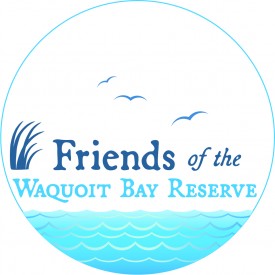Project Title: Evaluating the Impact of Hydrologic Alterations on Salt Marsh Sustainability in a Changing Climate
Project Partners: Cape Cod Mosquito Control Project, Louisiana State University, National Park Service, United States Fish and Wildlife Service, Rachel Carson National Wildlife Refuge, United States Geologic Survey, Waquoit Bay National Estuarine Research Reserve, Woods Hole Oceanographic Institution
Coastal managers are faced with the challenge of managing marsh hydrology in a way that meets human health needs, optimizes ecosystem services, and supports sustainability. In New England this includes accounting for the effects of ditches that were dug decades ago in 90% of the region’s salt marshes.
Ditches increase marsh drainage and reduce the spatial extent of shallow pools that may represent physical loss of buried soil carbon. However, efficient drainage may reduce the long-term sustainability of marshes by altering below ground biogeochemical and physical processes in a way that results in subsidence and lowered marsh elevation. Managers, restoration practitioners, and scientists at the Waquoit Bay National Estuarine Research Reserve, Woods Hole Oceanographic Institution, U.S. Geological Survey, U.S. Fish and Wildlife Service, National Park Service, and the Cape Cod Mosquito Control Project have expressed a need to understand the tradeoffs of hydrologic management strategies (i.e., ditch remediation, density, maintenance) and identify actions that will achieve user-specified outcomes— such as drainage, maintaining elevation, and carbon burial.
Products:
FACT SHEET: Project Overview
WHOI Website: Marsh Sustainability & Hydrology
Marshes, Mosquitos & Sea Level Rise-Oceanus Magazine Video Link
Marsh Sustainability and Hydrology (MSH) Project Webinar
October 2020
The MSH project is a collaborative research effort involving partners from the University of Georgia, Woods Hole Oceanographic Institution, Louisiana State University, United States Geological Survey, Cape Cod Mosquito Control, US Fish and Wildlife Service, National Park Service and the Waquoit Bay National Estuarine Research Reserve.
Coastal resource managers are tasked with making decisions that simultaneously address the welfare of local communities and the sustainability of salt marshes and the valuable ecosystem services they support. In New England, anthropogenic ditches were dug to reduce shallow ponds on the marsh platform where mosquitos breed, although this may have led to unintended consequences such as lower elevations and increased susceptibility to sea-level rise. In order to evaluate the net impacts of ditching to carbon storage and elevation resilience, we collected cores from the ditched and unditched sections of Great Barnstable Marsh (MA, USA) and measured and compared accretion rates, soil properties, soil organic carbon and ages to determine impact of ditching on marsh sustainability to sea level rise. A geomorphic model calibrated with field data was used to develop a decision support tool to help managers assess impact of different management strategies on salt marsh sustainability and ecosystem service delivery.
To view the workshop presentations please go to: Marsh Sustainability and Hydrology Project Webinar Presentation Videos
MSH Team Members:
Amanda Spivak, Principal Investigator, University of Georgia
Sheron Luk, PhD Student, Woods Hole Oceanographic Institution
Meagan Eagle, United States Geological Survey
Gabrielle Sakolsky, Director, Cape Cod Mosquito Control
Susan Adamovich, US Fish and Wildlife Service
Giulio Mariotti, Louisiana State University
Megan Tyrrell, Research Coordinator, Waquoit Bay National Estuarine Research Reserve
Tonna-Marie Surgeon Rogers, Director, Waquoit Bay National Estuarine Research Reserve

